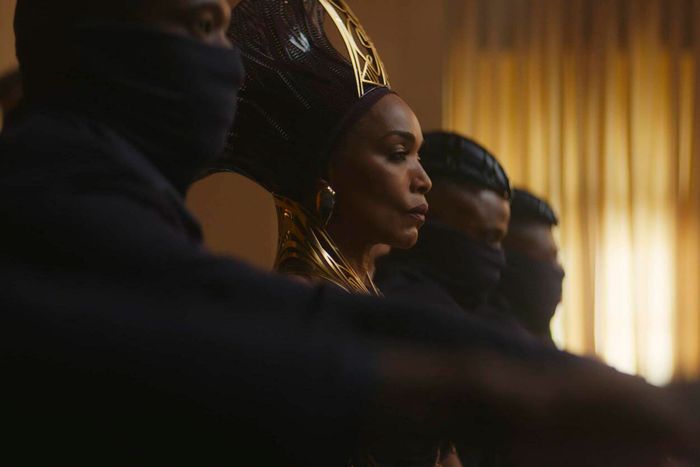
Over its opening weekend in theaters, Marvel’s Black Panther: Wakanda Forever showed its fangs at the North American box office, garnering $180 million in ticket sales to become the highest-grossing November release on record. In addition to ushering Letitia Wright’s brilliant, precocious scientist-princess-ass-kicker character Shuri into the superhero pantheon, it provided a much-needed boost to reeling multiplexes that have been starved of big-budget event titles since summer. The Ryan Coogler–directed sequel to 2018’s $1.4 billion-grossing Black Panther handily mauled the $158 million record set by The Hunger Games: Catching Fire almost a decade ago — an achievement all the more remarkable considering Wakanda Forever’s two-hour and 41-minute run time, its middling-to-positive reviews, and the absence of original star Chadwick Boseman, who imbued his titular role as Black Panther/King T’Challa with regal swagger and a stately decorum not commonly associated with comic-book movies. The actor died after a private battle with cancer in 2020 at age 43.
By contrast, Dwayne Johnson’s DC extended-universe entry Black Adam has only taken in $151.1 million domestically after four weeks in wide release. And in perhaps an even more unlikely measure of Panther 2’s mass appeal, it surpassed Steven Spielberg’s autobiographical drama The Fabelmans in terms of per-theater average ($40,946 versus $40,000) — never mind that the ecstatically reviewed presumed Oscar front-runner bowed in prestige-diktat limited release in just four theaters while Wakanda Forever rolled out wide in 4,396.
On the downside, Marvel’s 30th MCU movie may have failed to surpass Doctor Strange in the Multiverse of Madness, which stands as the year’s top opener, having grabbed $187.4 million during its May North American debut. Some prerelease “tracking” estimates indicated Wakanda Forever would deliver ticket sales north of $200 million. But as a second franchise addition to one of the most epochal arrivals in modern-superhero moviedom — Black Panther was the first stand-alone title plotted around a Black protagonist, the first megabudget superhero tentpole directed by an African American filmmaker and the first to feature a predominantly Black supporting cast, and the first comic-book adaptation to land a Best Picture Oscar nomination — Wakanda Forever is by every objective measure already breathing rare blockbuster air, easily on its way to becoming the studio’s 11th billion-dollar title.
To hear it from Hollywood box-office analysts, the $250 million sequel benefitted from months of fevered anticipation surrounding how and whom Marvel would choose to repopulate Black Panther’s vibranium costume. Then, arriving on the heels of years of COVID-19 disruptions to the movie-industry production pipeline and theatrical-rollout schemes, Wakanda Forever took on added valence as a movie–cum–cultural phenomenon on a par with Top Gun: Maverick and Spider-Man: No Way Home — shared cultural events/inescapable conversation fodder that audiences seemingly demanded to experience en masse rather than in the privacy of their homes. “Your friends, your family, everyone is going to see this film,” says Erik Davis, managing director of Fandango. “Those experiences are what we are chasing right now as moviegoers. This is one of those films.”
Although Wakanda Forever prominently features the Mesoamerican inhabitants of Talokan, a futuristic underwater city situated somewhere in the vicinity of Tulum in the film, and co-stars Indigenous Mexican actor Tenoch Huerta as Namor — Wakanda’s chief antagonist and a defiant anti-colonialist who battled Spanish conquistadors across the centuries — critical dialogue surrounding the movie’s treatment of race has been relatively muted. But as Davis sees it, the film’s symbolic showcasing of fantastical, superheroic Black and brown civilizations hasn’t been lost on everyday cineplexgoers. “There’s a reason why Black Panther movies are in awards conversations — and I think Wakanda Forever is going to be in the Oscars conversation,” he says. “It’s because there’s a level of power to them and a soul to them that really connects with people of all communities. What the films do so well is uplift these cultures and communities and tie them back to history. So even if the conversation around the first Black Panther felt a bit louder, I still think the conversation surrounding Wakanda Forever is just as powerful and meaningful.”
According to Shawn Robbins, chief analyst at BoxOffice Pro, the movie’s primary drawing power is as a “puzzle piece” to the Marvel cinematic universe’s interlocking-movie metanarrative but also as a celluloid memorial to Boseman. “That’s what’s been piquing a lot of interest for, not just fans, but for the non-Marvel faithful: the people who don’t necessarily come out for all the MCU movies,” the analyst says. “Chadwick passed away before they started filming. So the entire movie is built around consciousness of the fact he is not there.”
But at a precarious moment for Marvel, with Wakanda Forever functioning as the final installment of its relatively poorly received phase four and arriving just months shy of Thor: Love and Thunder (which took in $760.9 million worldwide this summer while standing at just 64 percent on Rotten Tomatoes), the film has to basically overperform in order to simply meet expectation. “Spider-Man had nearly unanimously great word of mouth,” Robbins says. “Then Doctor Strange and Thor divided audiences and fans. Black Panther is now in an important position because it not only needs to course-correct some of that but also bring back that feeling we used to have of going to see a Marvel movie.”
Moreover, Robbins feels Wakanda Forever must distinguish itself as Marvel’s premium product ahead of the studio’s 2023 raft of content, which includes three new movies and five Disney+ series. He adds, “They need to avoid that situation where the audience feels like watching Marvel becomes like doing homework.”
More on Black Panther: Wakanda Forever
- Angela Bassett Wasn’t ‘Allowed to Be Disappointed’ by Oscar Loss
- Black Panther Breakout Tenoch Huerta Accused of Sexual Misconduct
- Rihanna Brought IG Boyfriend A$AP Rocky to the Oscars


